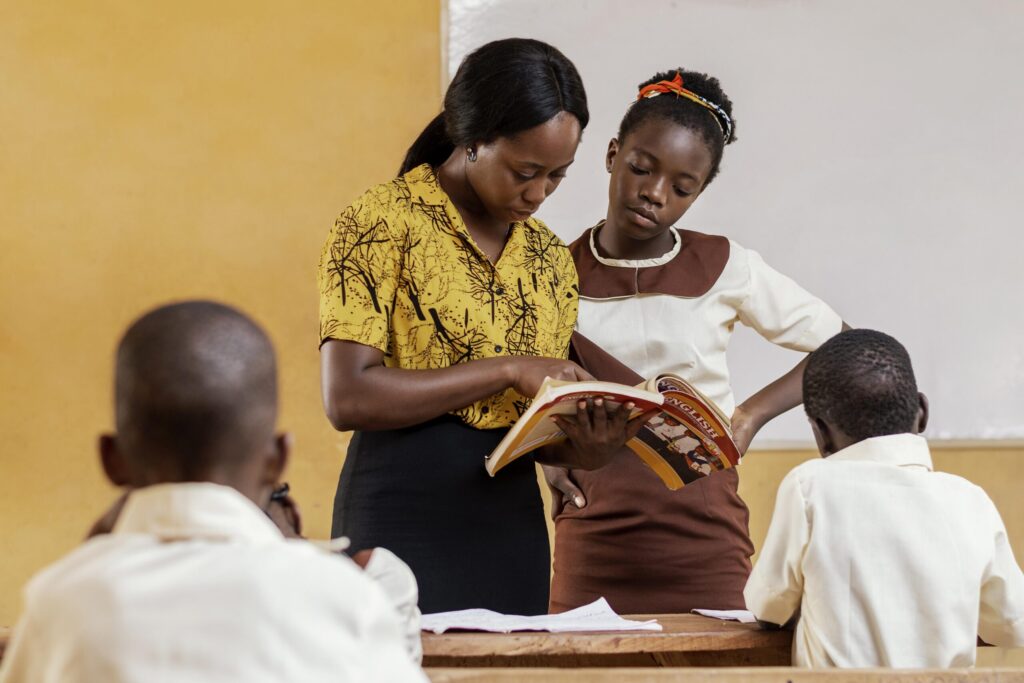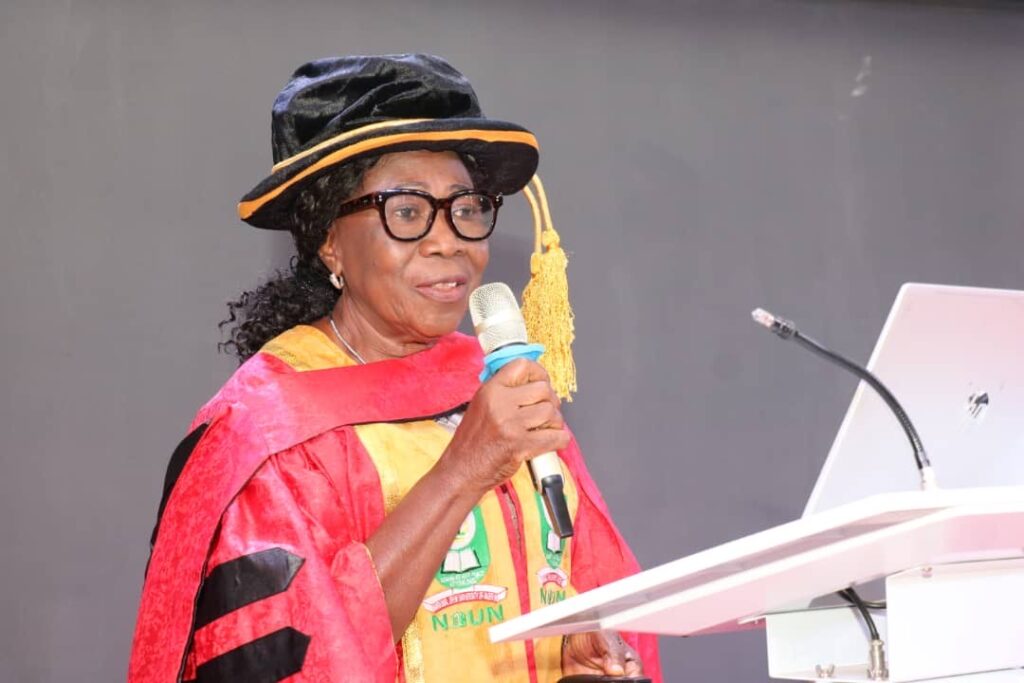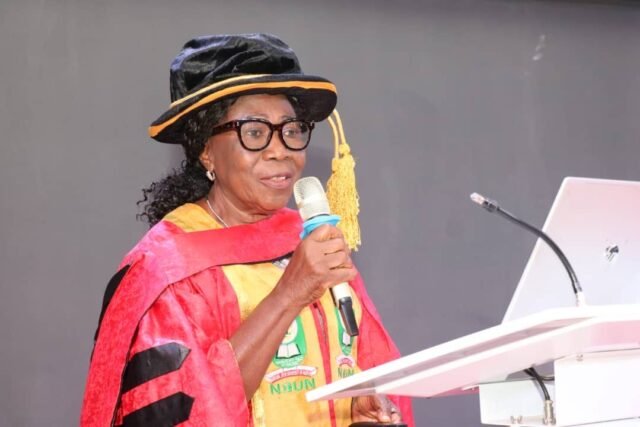In a passionate and authoritative address delivered at the National Open University of Nigeria’s (NOUN) Abuja campus, Professor Nnaka offered a compelling case: we must invest in teacher education as the definitive strategy to break persistent gender barriers in STEM education. As the university’s 34th Inaugural Lecture, titled “Professional Teacher Education: A Catalyst for Widening the Gateway to Gender Equity in STEM”, her remarks galvanised educators, policymakers, and advocates alike toward systemic reform.
Table of Contents

Teachers: The First and Most Influential Gatekeepers of STEM Inclusion
Professor Nnaka began with a bold assertion: teachers frequently form students’ first critical exposure to science, technology, engineering, and mathematics (STEM). How these educators are prepared determines whether they uphold stereotypes or cultivate inclusion.
“Teachers can either be gatekeepers of inequality or champions of inclusion,” she declared, adding: “The difference lies in how they are trained.”
Her message was crystal clear: professional training in gender-responsive pedagogy is not optional — it’s essential.
STEM: More Than Curriculum — It’s a National Imperative
Expanding beyond the classroom, Professor Nnaka reframed STEM as vital to Nigeria’s long‑term economic and social prosperity. Innovation relies on tapping every talent pool. By allowing girls to fall behind, the nation forfeits half of its potential inventors, problem‑solvers, and leaders. With fewer than 30% of researchers worldwide being women—and in Nigeria just 17% of tertiary STEM enrolments female—this deficiency is urgent, not abstract.
Identifying Root Causes: Curriculum Bias, Social Norms, and Lack of Role Models
Drawing from over 40 years of academic work, administrative leadership, and community interventions, Professor Nnaka described the multifaceted barriers blocking girls from STEM:
- Curricula and teaching materials that reinforce gender assumptions.
- Deep-rooted cultural norms deeming STEM as “male domains.”
- Scarcity of female mentors and visible role models.
- Teacher bias—conscious or unconscious—that undermines girls’ confidence.
These issues, she argued, cannot be reformed through isolated projects; they demand structural transformation in teacher preparation, ongoing professional development, and institutional policy.

Evidence-Based Solutions: ODL, Curriculum Reform, and Mentorship
Professor Nnaka’s lecture highlighted several intervention areas with strong empirical backing:
- Open & Distance Learning (ODL) programs that enhance female participation, especially in remote or underserved communities.
- Gender-sensitive curriculum redesign that challenges dated biases and encourages inclusive STEM thinking.
- Mentorship networks, especially led by trained female teachers, have been shown to boost girls’ academic performance and retention in science and engineering tracks.
Her effectiveness argument: professionalised teacher education is not just an accessory—it’s the engine of progress.
Policy Imperatives: Institutionalising Gender-Responsive Teacher Training
Recognising the power of policy, Professor Nnaka called for national and regional frameworks that mandate:
- Gender-aware STEM teacher curricula,
- Ongoing professional development in inclusive pedagogy,
- Monitoring systems to evaluate classroom gender equity outcomes.
These measures, she asserted, are critical for driving sustainable change across Nigeria’s education sector.
Academic Leadership Endorses the Vision
In his opening remarks, NOUN Vice-Chancellor Professor Olufemi Peters—represented by Deputy Vice-Chancellor Godwin Akper—hailed the lecture as more than academic rhetoric. It was a clarion call to reshape society’s educational trajectory:
“This inaugural lecture is not just another academic engagement,” the VC noted. “It is a reflection of where we are as a society and where we must go if we are to break the chains of inequality and empower the next generation.”
Why Teacher Education Is Central
The concept may seem narrow, but the logic is powerful:
- Teachers shape classroom culture: Their beliefs and practices influence who participates and how.
- Teacher-student dynamics influence self-efficacy: Girls often underperform when teachers are confident or promote bias.
- Role modeling matters: Female STEM teachers offer students credible blueprints for success.
- Intervention at the systemic level: Training teachers broadly scales gender equity work far beyond individual classrooms.
A body of research affirms this. Studies have shown:
- Teacher training focusing on gender bias improves girls’ confidence and STEM outcomes.
- When teachers attribute gender gaps to innate ability rather than societal bias, they reinforce exclusion.
- Broader family and peer influences also matter, but teacher impact remains central.
Contextual Backdrop: Gender Equity Gaps in STEM Globally and Locally
While global progress is slow but measurable, systemic challenges persist. UNESCO’s GEM 2025 report emphasises enormous inequities in women’s participation in technical education and leadership roles, especially in lower-income nations.
In Nigeria, where only 17% of STEM students are female, cultural norms and institutional bias continue to thwart girls’ academic trajectories. Nnaka’s framework cuts through this by targeting teacher capacity rather than relying on softer societal persuasion alone.
Narratives & Recommendations: Next Steps Toward Equity
Professor Nnaka urged a coordinated national strategy:
- Curriculum designers must review and revise content for gender bias.
- Teacher education institutions should embed gender-responsive training across diploma and certification programmes.
- Ministries and regulatory bodies must set and enforce standards for inclusive teaching competence.
- Continuous professional development must be monitored and evaluated, with clear impact metrics.
- Mentorship programmes and female role model networks should be institutionalised.
- Data collection efforts must track gender equity metrics in classrooms, graduation, and employment outcomes.
Why This Approach Matters
The enduring “leaky pipeline” in STEM—from early schooling through tertiary education and into the workforce—is not merely a symptom of individual choice. It stems from systemic exclusion. Teacher education, Professor Nnaka argued, is the most impactful leverage point available today to reverse that trend.
Without a change in how educators are prepared and supported, well-intentioned campaigns, quotas, or awareness drives risk becoming superficial. With it, the educational culture itself shifts—from gatekeeping to empowerment.

Conclusion
Professor Nnaka’s lecture marks a milestone in Nigeria’s public discourse on gender and education. Her argument reframes STEM inclusion not as charity or afterthought, but as central to national development.
By energising teacher education as the linchpin of gender equity in STEM, she offers Nigeria—and by extension, policymakers across Africa—a scalable, sustainable blueprint to unlock female potential and narrow STEM disparities at scale.
Join Our Social Media Channels:
WhatsApp: NaijaEyes
Facebook: NaijaEyes
Twitter: NaijaEyes
Instagram: NaijaEyes
TikTok: NaijaEyes
READ THE LATEST EDUCATION NEWS








































